- Home
- Bruce, Leo
Case with No Conclusion Page 2
Case with No Conclusion Read online
Page 2
“Did anyone see you come in?” I asked.
“I said ‘Good evening’ to the porter,” replied young Ferrers, “and asked him if anyone had called for me, as I was half expecting another friend to come round during the evening. He said that no one had been there, and I went to bed.”
Already in my mind the beginnings of a possibility were forming.
“You won’t mind if I ask you,” I said, “whether there is a way out of your flat except by the front door? I’m visualizing the possibility of some accusation being made against you,” I added pacifically.
Peter Ferrers seemed quite undisturbed. “There is a service lift at the back by which I sometimes come in and out, but it would not be possible to come in this way after eleven o’clock when the outer doors are locked. There is also a fire-escape, but it leads down into an open court out of which there is no exit without disturbing the people who live round it.”
“When did you first hear of the murder?” I persisted.
“Duncan, the butler, rang me up at nine o’clock next morning, and I went straight down there. It appears that after I left two of the servants heard a violent quarrel between my brother Stewart and Doctor Benson.”
I groaned. “There is always a violent quarrel,” I said. “How can I expect to make a good story of Beefs cases, when they conform so closely to type?”
“I’m bound to admit,” said Ferrers rather curtly, “that I’m less concerned wth your efforts at fiction than I am with the clearing of my brother’s name.”
“Quite right,” approved Beef, “it’s only natural. Go on, Mr. Ferrers.”
“After a while my brother rang for Duncan, told him that he’d want nothing more, and that he would show Benson out himself. Duncan locked up everywhere, as was his habit, and went to bed. The other servants had already gone up. Nothing more was known until a housemaid came down in the morning and found the doctor’s body in an armchair in the library where he and my brother had been sitting. He had been stabbed in the throat-apparently with a single blow which had opened the jugular vein. An ornamental dagger which my father had bought many years before in an antique shop, and which normally lay on the library table, had been used, and had been put back on the table beside the chair in which the corpse was. My brother’s finger-prints were found on the dagger, and in the room itself only those left by the guests of the night before. My brother, of course, knew nothing about it. He had shown Doctor Benson out some time, he thought, between eleven and half-past, and had gone straight up to bed. He had heard nothing during the night, and was sleeping soundly when he was called the following morning. That is as much as we know for certain.”
“The front door was locked when the servants came down in the morning, I take it?” asked Beef.
“Yes, as usual, by the Yale lock. It’s not bolted, as my brother gives the servants all the freedom he can, and if the girls want to go to the cinema or a dance they come in that way.”
“There was no sign of anyone having broken in anywhere?” asked Beef.
“None whatever.”
“Who had latch-keys?”
“The butler, Wilson, the chauffeur-gardener, the cook, and the two girls.”
“And you?” I asked.
Young Ferrers smiled. “No,” he said, “I used to have one when I lived at home, but I haven’t seen it for years. I’ve had no need for it lately anyway.”
“Then it looks,” said Beef, “as though either your brother isn’t speaking the truth about showing Benson out, or someone that had a latch-key brought him in. Or else he had a latch-key himself.”
“Yes, those are the three possibilities, I suppose,” said Ferrers.
“Very funny. Very funny indeed,” was Beefs solemn reflection. “I suppose the best thing we can do is to get down to this house and have a look round. What about going straight away?”
“Very well,” said young Ferrers, rising with some relief.
“There’s just one thing,” said Beef, “which is important in any murder case, and I should say is more important in this one than usual. What time did the doctor say Benson was killed?”
“Well,” said Ferrers, “he didn’t give an exact time. He said that Benson must have died somewhere within an hour either side of midnight. That was as far as he could say.”
Chapter III
RAIN was falling gently, and it was already dusk when we climbed into Peter Ferrers’s car. The shining grey pavements of Lilac Crescent were almost empty in the pause just before the stream of people began to flow from the offices around to the nearest Underground station, and the anonymous occupants of the street itself began to drop home in ones and twos. Ferrers pulled up the grey hood of the large, shabby touring car which he had left standing outside Beefs door, and started the engine.
Beef sat forward in his seat uneasily and watched the traffic.
“Lucky for you I’m not still in the Force,” he said at last; “you don’t let nothing past, do you? In the built-up area too.”
Young Ferrers did not answer, but sat almost carelessly in the driving-seat with only one hand on the wheel. The car swung easily between trams and blocked traffic.
Soon the traffic thinned as we got away from the centre of the town and the car kept at an even steady speed. Beef was silent for a long time. Then suddenly he turned to Ferrers. “What did you say the name of this house was?” he asked.
“The Cypresses.”
“Funny. I thought you said the cider presses. Just shows how the stomach interferes with the ear sometimes. That’s psychology, isn’t it?” he added, turning to me.
But Ferrers interrupted. We had just turned into a long, wide street lined on either side by a high wooden fence which the rain had made black and protective.
“This is the road,” said young Ferrers; “the house is just up here on the left.”
As the car slowed down I realized what had inspired the unattractive name of the place. Half a dozen tall trees stood inside the fence so that the house was not visible from the road. They were dark, unjoyous things, not at all like the green flames Van Gogh found them to be in his paintings. They hung like a gloomy backcloth, the light from the street lamps flattening them and the fence into one dark wall.
The front gate stood open and Ferrers drove straight in. The house that stood before us must have been built in the same period that Elizabeth Barrett Browning’s father had designed and built that large half-Turkish palace in which he never lived. Large houses of this type always seemed to express something of their owner’s revolt against the age he lived in, as though the only relief from the “big business” of the period was in the slight fantasy of its architecture.
Not that the Cypresses was at all fantastic. It stood cold and dark, respectably isolated in its own ground, but the spread of its ground-plan was that of a more pretentious age. Like Abraham, the Victorians liked to feel that their seed would be as the sand of the sea-shore—and they built their houses accordingly.
In the light drizzling rain, and in the shadow of the row of cypresses, the house had a complacent look. Sodden ivy almost covered one side of it, climbing half-way up the tower which stood guardedly at one corner. The single lamp over the porch was too feeble to keep the shrubs more than a few yards away from the door, and they stood in a close, damp semicircle, well kept and trimmed, but aggressive in their rootedness. A young elder grew close against the wall, in a corner where the light could not reach it.
“Not much of a miner’s dream of home,” said Beef, as we climbed out of the car and stood for a moment on the sticky gravel of the drive. “Do you mean to say your brother lived here because he wanted to?” he added incredulously.
The elderly man who opened the door looked surprised to see Peter Ferrers, but he said nothing as we walked into the long tiled hall and he took our coats. I had been prepared for almost any sort of severity or extravagance in the interior of the house, but the cold hall, with its dark blue-green tiles, was a surprise. It was l
ike a corridor in a municipal council office, clean and almost disinfected. There were no rugs on the floor and the walls were bare and dull with their dim yellow distemper. A heavy coat-rack was the only furniture—a lonely and tortured tree, with its mahogany arms flat against the wall like slow dark rivers curving lazily in a level country. But Beef did not seem at all impressed.
“Well,” he said briskly, “where did you find the body?”
Young Ferrers smiled faintly and led us across the hall. “This is the library,” he said, “but I’m afraid you won’t find much in here. The police have been over it pretty thoroughly.”
“Ah,” said Beef, “you never know. It’s the little things what count.” He paused, as though searching for the right phrase. “Now where was Doctor Benson sitting when they found his body?” he asked at last.
Young Ferrers pointed to an armchair. Across the leather of the back and down the inside of one arm there was a dark patch.
“Blood, I presume,” said Beef. “Would you mind”—he turned to Peter Ferrers—“just sitting there for a moment—like you was the dead man? So’s I can get a picture of the room?”
I knew what Beef was thinking. He wanted to reconstruct the crime in the well-known manner, and although I approved of the method for dramatic purposes I could not see what use it could be at the moment. He looked pensively at the seated Ferrers and fingered his moustache.
“Ah,” he said at last. And he might have meant anything.
“The police took the dagger away,” said Ferrers, as he rose self-consciously from the chair.
“Where was it found?” asked Beef.
“On the table, the maid said.”
“Didn’t you see it there, then?”
“No, the police had come by the time I got here and they’d taken it away for finger-prints. They said everything else was to be left exactly as it was.”
“Who did see the dagger, then?”
“Well, there was the maid who found Benson, Wilson, the chauffeur-gardener, and Duncan.”
“You know,” said Beef, as he began to wander slowly around the room once more, “it’s surprising the things what the police don’t see when they look into a thing like this. To begin with, they don’t just look around, they start straight away to look for something. So there’s bound to be a little detail here or there they miss.”
“You should know,” I reminded him smartly.
He paused, as I said this, by the table on which had been found the dagger, and on which still stood two used glasses and a decanter. Beef picked up one of the glasses and sniffed loudly at the contents.
It was the sort of thing Beef would do, I thought. He was in the middle of investigating a stabbing case and he started off by smelling the inside of a whisky glass.
“What does it smell of?” I asked sarcastically.
“Whisky,” said Beef promptly. “Good whisky too. Not that I hold with it much. All over and done with too quick for my liking. Still, everyone to his taste.”
Ferrers, who had been smiling vaguely at Beefs “investigation” of the room, now interrrupted.
“I expect you’ll want to interview the servants,” he said.
“Oh, ah,” said Beef, “I suppose I ought to. Would you mind sending them in? The girl who found the body would be the best one to start with.”
As Ferrers left the room, Beef turned suddenly to me. “Here,” he said sharply, “there’s a bottle in my bag. Fill it up with the whisky from that decanter. Look sharp, before he comes back.”
“But, Beef,” I protested, “we can’t steal his whisky. You can’t walk into someone’s house and just walk off with…”
“You do what I say,” cut in Beef. “Never you mind what we can and what we can’t do. I’ll keep a look-out while you do it, and don’t you say nothing to nobody about this—I’ll tell you all about it when we get outside.”
Reluctantly I did as Beef said, and began to empty some of the whisky into a bottle. When the decanter was about half empty I went to replace it on the table, but Beef saw me.
“All of it,” he said; “don’t leave a single drop there. And what’s in the glasses too.”
I had just time to put the bottle back in Beef’s bag when there was a light tap on the door, and the girl came in.
“You wanted to see me?” she asked.
“Yes,” said Ferrers, who had followed her into the room. “Sergeant Beef here wants to ask you a few questions about the murder.”
The girl came across the room and stood facing Beef. She seemed slightly nervous, and smoothed her dress continually as she waited for Beef to begin. Pretty rather than beautiful, she had small, almost perfect features, and fair wavy hair which was untortured by hot irons or electric currents. Probably she wore no hat out of doors, for there were strands of hair, bleached paler by the sun, which she had drawn back from her forehead into a wide, almost old-fashioned hair-clip.
Beef produced his enormous notebook and laid it on the desk in front of him.
“Do you remember what you did that night, the night Doctor Benson was murdered?” he asked.
The girl was picking nervously at her cuff with quick bird-like movements, and did not answer for a moment. “I went to bed early,” she said at last; “it was quite soon afer Mr. Peter’s car drove away—about a quarter to ten I should think it was.”
“How did you know it was Mr. Peter’s car?” asked Beef quickly.
The girl looked bewildered for a moment before she answered. “Well, of course,” she said, “it might not have been, but it was the only car in the drive, so I thought it must be.”
“Did you hear anything in the house during the night?” I asked her.
“No, I must have gone straight to sleep.”
“And you didn’t wake up until the morning?”
“Not till seven o’clock.”
Beef scratched his head with his pencil as if he were not sure what to ask next. “And then,” he said weightily, “you found Doctor Benson.”
The girl nodded. She seemed to have anticipated the next question, for her eyes widened slightly as she watched Beef licking his pencil to make a note. As I looked at her small pale face it seemed to me that though she was obviously thinking of the body of the dead doctor as she had found it that morning, she was, in reality, quite unaffected by the murder or the arrest of Stewart Ferrers. In an independent type this would have not been surprising, but she was so clearly the reverse of this. She was answering Beefs questions as she would tell anyone the time—a subject others might find interesting but which somehow left her completely untouched.
Beef finished his laborious note-taking and turned to her again. “Perhaps,” he said, “you could tell us something about how he was lying and that. Tell us just what happened after you come down, and how you found the body in the chair.”
The girl gave a quick glance at Peter Ferrers before she answered, and apparently reassured, she turned back to Beef.
“Well,” she said, “I came down as usual about half-past seven to clean up before breakfast, and after I’d done the hall and dining-room I came in here. The armchair had its back to the door, and I thought to myself—there’s that Doctor Benson slept here all night—I could see it was him because of the top of his head. It just showed over the back of the armchair, and I recognized the bald spot. Well, then I didn’t know what to do. I thought if I woke him up he might be cross with me, and then again if I didn’t Mr. Stewart might not like the room being left. So I thought I’d better try and do the room without waking him up.”
“Why were you frightened Doctor Benson might be cross?” I asked.
The girl looked quickly across at Ferrers again, and then said, “Because he always was cross, sir.”
“He was always cross with you?”
“With all of us.”
“Didn’t you like Doctor Benson?” asked Beef.
“It wasn’t exactly not liking him,” answered the girl, “but he used to be rather short with u
s like. Anyway, we always kept out of his way if we could—all except Ed…all except Wilson, and he seemed to think he was all right.”
“Ah,” said Beef. “Go on, then. When did you see that he was dead?”
“I was trying to tidy the room without making a noise, and there were some books on the table. Just as I was going over to pick them up I saw the knife lying just beside them, all covered with blood. It gave me a bit of a turn, but I didn’t think nothing serious had happened and I went round to pick it up. But before I touched it I saw the doctor and I must have made a bit of a noise, although I don’t remember screaming, because the chauffeur was passing round the house just then and he heard me. So he came in, and when he saw the blood and that he took me outside.”
Suddenly she turned to young Ferrers as if she could not really express herself to Beef clearly enough. “It was awful, Mr. Peter,” she said, “what with the blood all over everything, and the way his head hung over on one side. There was a big hole in his neck and all his coat and the armchair was red. And there was a funny sort of smell in the room that made me want to be sick. At first I had thought it was just the windows being closed all night, but then when I knew what it was…a sort of warm salty smell.”
Beef waited a moment before asking his next question, and then, as if gently leading her away from the memory of the body, he said, “How long have you worked for Mr. Ferrers?”
“Nearly a year.”
“Do you like working for him?”
“We don’t hardly ever see him,” she said guardedly.
Beef nodded. “Now about this knife,” he said. “You say it was lying on the table. What was there unusual about it that made you notice it?”
“Why, the blood,” said the girl in surprise.
“What I mean is,” persisted Beef, “that there wasn’t anything unusual in it being on the table?”

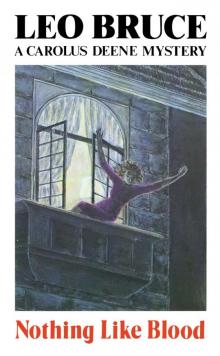 Nothing Like Blood
Nothing Like Blood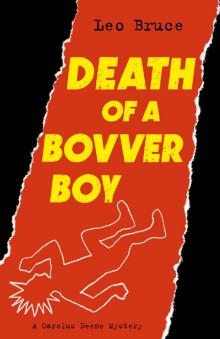 Death of a Bovver Boy
Death of a Bovver Boy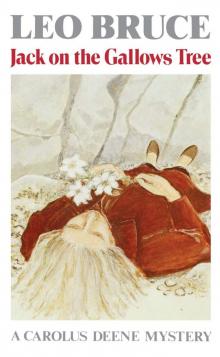 Jack on the Gallows Tree
Jack on the Gallows Tree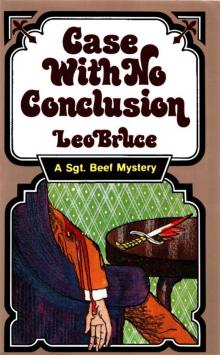 Case with No Conclusion
Case with No Conclusion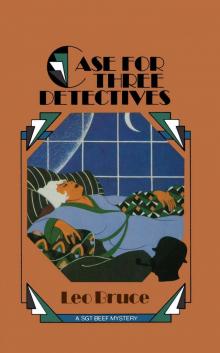 Case for Three Detectives
Case for Three Detectives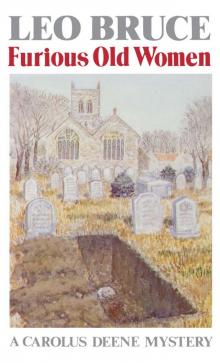 Furious Old Women
Furious Old Women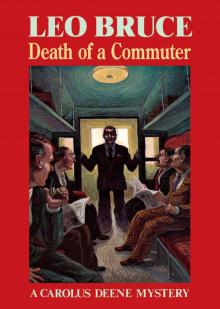 Death of a Commuter
Death of a Commuter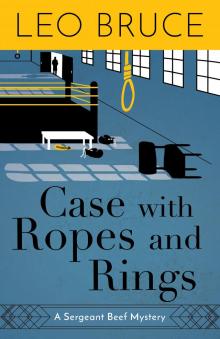 Case with Ropes and Rings
Case with Ropes and Rings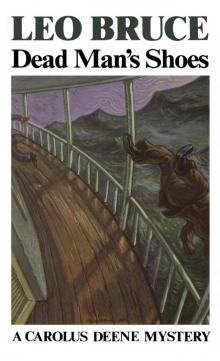 Dead Man’s Shoes
Dead Man’s Shoes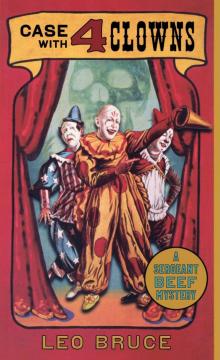 Case with 4 Clowns
Case with 4 Clowns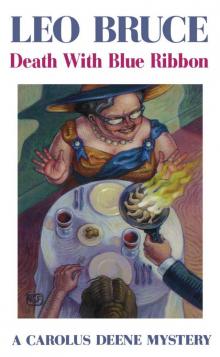 Death with Blue Ribbon
Death with Blue Ribbon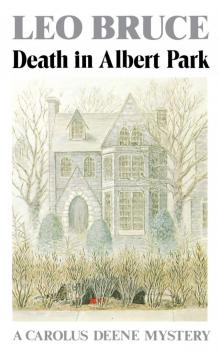 Death in Albert Park
Death in Albert Park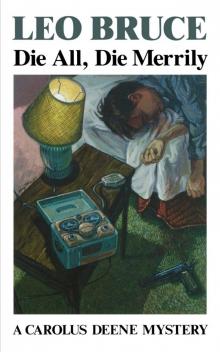 Die All, Die Merrily
Die All, Die Merrily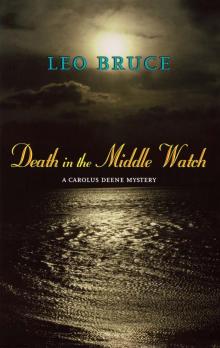 Death in the Middle Watch
Death in the Middle Watch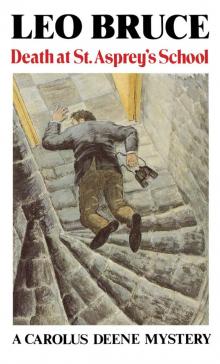 Death at St. Asprey’s School
Death at St. Asprey’s School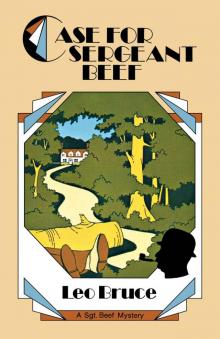 Case for Sergeant Beef
Case for Sergeant Beef